2011-12-21 | Season's greetings
The Knowledge Media Reseach Center wishes you a Merry Christmas and a Happy New Year with thanks for your faithful cooperation.
The Knowledge Media Reseach Center wishes you a Merry Christmas and a Happy New Year with thanks for your faithful cooperation.
On December 5th, Dr. Manuela Glaser did a guest seminar within the course on "Hybrid Documentaries" offered at the Sint-Lukas Brussels University College of Art and Design in Brussels. Dr. Glaser talked about "Hybrid documentary formats: How entertaining elements in archaeological television documentaries influence processing, experience, and knowledge acquisition".
Manuela Glaser explained various entertaining characteristics of hybrid documentary formats and their influence on recipients' cognitive processing, experience, and knowledge acquisition.
On December 1st, Dr. Devin G. Ray delivered an invited talk, “Boundary Conditions and Process Mechanisms of Recognition Bias”, to the Department of Psychology at the University of Lancaster in the UK.
Dr. Ray discussed his ongoing work on recognition bias, the reliable tendency for people to recognize others who share their ethnic or social groups better than others who do not share their ethnic and social groups. This work attempts to understand the natural circumstances in which recognition bias will disappear as well as the implications of different limiting conditions for process explanations of this phenomenon.

How can teachers make effective use of digital technologies in their teaching? How can they use digital tools to enhance student learning? What do they need to know to be able to do so? And, what can research tell us about how to answer these questions in order to help teachers acquire the necessary professional knowledge and to develop the necessary professional skills?
The international workshop aims at initiating a discussion on "Knowledge and Skills related to Digital Tools for Teaching and Teacher Training - Cognitive Processes involved in Teachers’ Technological Pedagogical Content Knowledge (TPACK)". The workshop will take place at the Knowledge Media Research Center in Tuebingen, Germany, on October 25th.
For further information please refer to the conference web site.
At this year's ECER Conference in Berlin, Prof. Hesse, Knowledge Media Research Center Tuebingen, Germany, highlighted the importance of collaborative problem solving skills to meet the educational challenges of the 21st century.
Collaborative problem solving can be conceptualized as a mixture of social and cognitive problem solving skills. The social (collaborative) part refers to the way the groups coordinate their activities and is related to sub-skills, e-g., participation, perspective taking and social regulation.
ECER 2011 dealt with Urban Education. The conference took place from September 13th to 16th 2011 in Berlin.
At this year's Earli Conference and JURE Pre-Conference in Exeter, United Kingdom, scientists and junior scientists from the Knowledge Media Research Center Tuebingen, Germany, present new studies and findings, e.g., on teacher's mental models, learning with video tools or learning with visualization:
Leveraging the affordances of YouTube: Mental models of Technology affordances and aspects of pre-service teachers’ planning for technology integration
(Karsten Krauskopf)
Fortune Favours the Bold (and the Italicized), but Why? Revisiting the Disfluency Effect (Katharina Scheiter,Anne Schueler)
Digital video as a tool to support learning (Carmen Zahn, Karsten Krauskopf, Friedrich Hesse; Roy Pea (Stanford University)
Learning about locomotion patterns with static-simultaneous visualizations and motion-indicators (Birgit Imhof, Katharina Scheiter, Peter Gerjets, Jörg Edelmann)
The EARLI Conference 2011 takes place from 30 August - 3 September in Exeter, United Kingdom. The conference title is "Education for a Global Networked Society".
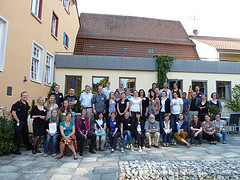
From August, 1st till August 4th, 2011, 31 international young researchers took part in the first international Summer School oft he ScienceCampus Tuebingen and the Leibniz Graduate School for Knowledge Media Research at the Swabian Alb. The summer School dealt with the topic „Making Sense of Social Media“.
The participants worked out and discussed new research questions and methods in three different workshops concerning knowledge building, knowledge exchange and social networks. Sonja Utz (VU University, Amsterdam), Dan Cosley (Cornell University, Ithaca) and Jan van Aalst (The University of Hong Kong) acted as workshop leaders. Robert Kraut (Carnegie Mellon University, Pittsburgh) and Judith Donath (Harvard University, Cambridge) lectured as keynote speaker on the first afternoon.
For further information please have a look at the Summer School website.
At the 9th International Conference on Computer-Supported Collaborative Learning, Prof. Ulrike Cress, was elected as new Associate Editor of the International Journal of Computer-Supported Collaborative Learning (ijCSCL).
The International Journal of Computer-Supported Collaborative Learning (ijCSCL) is a professional journal founded in 2006 by the International Society of the Learning Sciences (ISLS).
Ulrike Cress heads the Knowledge Construction Lab at the Knowledge Media Research Center Tuebingen, Germany. Besides Computer Supported Collaborative Learning (CSCL) her research interests mainly concern social software, knowledge management, social dilemma as well as the development,
implementation and evaluation of media-supported learning environments.
The first joint Summer School for talented junior researchers, organized by The Leibniz Graduate School for Knowledge Media Research (located at the KMRC Tuebingen) and the ScienceCampus Tuebingen will take place from August 1st to August 4th 2011. The Summer School addresses empirically oriented psychologists and social scientists dealing with questions in the field of Web 2.0 and social media.
Keynote speakers are Robert Kraut (Carnegie Mellon University, Pittsburgh, PA) and Judith Donath (Harvard University, Cambridge, MA)
For more information on the program please check out the Summer School website.
Prof. Kai Sassenberg, head of the "Social Processes" Lab at the Knowledge Media Research Center in Tuebingen, Germany, will become part of the Editorial Board of the European Journal of Social Psychology. From 2012 to 2014 Kai Sassenberg will take over the position as Associate Editor.
The European Journal of Social Psychology publishes articles of all kinds of topics in the field of social psychology. It is one of the leading international journals in its field.
The official EASP conference 2011 started with a preconference on "The application of self-regulation approaches to social psychological phenomena" organized by Kai Sassenberg, KMRC Tuebingen, Kai Jonas, University of Amsterdam, and Daan Scheepers, University of Leiden.
It seeked to establish a more “social” view on self-regulation theories by focusing on the intersection of basic (intra-personal) cognitive and motivational principles and inter-personal, intra-group, and inter-group phenomena like negotiation, leadership, decision-making, health processes, stereotyping, discrimination, and media effects.
Several members of the KMRC, are going to present their research and perspectives, e.g., on motivation, power, knowledge processes, and the ostracism effect at this year's EASP meeting:
"The impact of internal motivation to respond without prejudice on the regulation of activated stereotypes" (Jennifer Fehr; Kai Sassenberg; Kai Jonas)
"I have the power, so I could have changed it – Power and counterfactual thinking after failure" (Annika Scholl, Kai Sassenberg)
"Knowledge hoarding during cooperation: The role of social comparison and knowledge awareness" (Devin Ray; Kai Sassenberg; Jürgen Buder; Friedrich Hesse)
"A non-social ostracism effect: Understimulation is involved in effects of being excluded and ignored" (Johann Jacoby; Kai Sassenberg)
To find out more about the presentations and the conference program, please visit http://www.easp2011.com/.
The ninth international conference on Computer Supported Collaborative Learning (CSCL) brings together experienced as well as early career researchers, e.g., from the field of education, cognitive, social and educational psychology, didactics, computer, sociology or design.
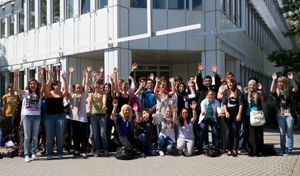
50 pupils from a secondary school in Nuertingen visited the KMRC last week to gain insights into KMRC's research on the use of digital media in classrooms and exhibitions.
After a short introduction given by Prof. Schwan, the pupils participated in different experiments such as web search, eye-tracking studies and experiments to analyse the potentials of multi-touch technologies.
In her talk Katharina Scheiter addresses the use of digital media for teaching perceptual skills in clinical diagnostics. The 2nd International Conference on "Research in Medical Education" - themed "Shaping Diamonds. From Bench to Bedsides" - brings together European and American researchers from different disciplines.
When? May, 26th 2011 at 11:15 a.m.
Where? University of Tuebingen, Germany
Katharina Scheiter is head of the Multimedia Lab at the Knowledge Media Research Center, Tuebingen, Germany. Her research focus is on cognitive and perceptual processes in learning from multimedia.
The ICCE Conference on Computer-supported Collaborative Learning (CSCL) and Learning Sciences will take place from November 28th, 2011 (Monday) to December 2nd, 2011 (Friday) in Chiang Mai, Thailand. The call for papers is open until May 27th 2011.
To find out more about the topics that are covered by CSCL and the submission procedure, please access the conference website.
The talk deals with the increasing importance of Computer-Supported Collaboration (CSC) in virtual groups. Prof. Hesse discusses the potentials that arise by reasons of interaction and focusses on new possibilities to make group members aware of their collaborators' dispositions and their knowledge.
The talk will be presented at the International Conference on Computer Supported Education (CSEDU), Noordwijkerhout, The Netherlands, May 6th-8th.
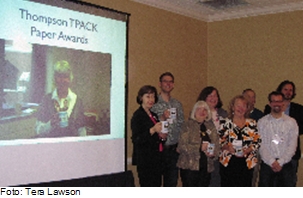
The contribution "Leveraging the Affordances of YouTube: Pedagogical Knowledge and Mental Models of Technology Affordances as Predictors for Pre-Service Teachers' Planning for Technology Integration" for this year's conference of the "Society for Information Technology and Teacher Education (SITE)" was honored with the "Outstanding Paper Award" and the "TPCK-SIG-Award".
The paper, written by Karsten Krauskopf, Carmen Zahn and Friedrich W. Hesse, deals with teachers' professional knowledge how to use the potential the video platform YouTube offers for learning and teaching in the classroom.
Krauskopf, K., Zahn, C. & Hesse, F.W. (2011). Leveraging the Affordances of YouTube: Pedagogical Knowledge and Mental Models of Technology Affordances as Predictors for Pre-Service Teachers' Planning for Technology Integration. Proceedings Paper - SITE 2011 - Nashville, Tennessee, USA - March 7 - 11, 2011.
Karsten Krauskopf received the awards on Wednesday, 9th, at the SITE conference in Nashville,
Tennessee, USA.
The first joint Summer School for talented junior researchers, organized by The Leibniz Graduate School for Knowledge Media Research (located at the KMRC Tuebingen) and the ScienceCampus Tuebingen takes place from August 1st to August 4th 2011. The Summer School addresses empirically oriented psychologists and social scientists dealing with questions in the field of Web 2.0 and social media.
It presents a unique opportunity for young researchers to meet fellow researchers and learn from outstanding scientific leaders by developing new research ideas. Across three parallel workshop tracks (about 10 participants each), the Summer School "Making sense of social media" provides the framework to discuss recent developments from a scientific point of view, share ideas and gain insights into how we as a research community can make sense of social media.
For more information please check out the Summer School website.
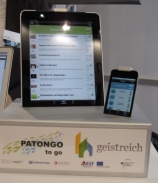
The PATONGO portal, a web 2.0 networking platform for practitioners within the Protestant Church in Germany, seeks to pool good ideas and experiences of its practitioners, and make this knowledge available for others
to draw from. The platform supports collaborative learning processes as well as creative thinking.
Come and visit PATONGO at the CeBIT trade fair, Hannover. Germany
March 1st-5th, Exhibition hall 9, booth D06
Your contact person for this project at the KMRC is Dr. Christina Matschke.
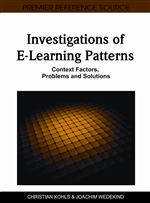
Highly structured description formats (patterns) can help to externalize the implicit knowledge of an expert. The book Investigations of E-Learning Patterns: Context Factors, Problems and Solutions, edited by Christian Kohls, and Joachim Wedekind, Knowledge Media Research Center (KMRC), Germany, offers a strategic pattern-based framework of how educators can approach online learning or e-learning.
Can e-learning patterns be equally successful as their pendant in software development? This is on of the questions, the book poses. It gives insight into important research methods and results, and addresses both e-learning practitioners and researchers. The book is the result a workshop on e-learning patterns that took place at the Knowledge Media Research Center in 2009.
Currently, the pattern approach is further investigated by the KMRC within the context of the project "Patterns and Tools for Non-Governmental Organizations (Patongo)" dealing with knowledge management in large organizations.
The book was published by IGI Global.
DOI: 10.4018/978-1-60960-144-7
ISBN10: 1609601440
Due to ever-emerging technology learning and working environments are constantly changing. For instance, Web 2.0 and the Social Semantic Web are changing how we absorb, research and relay information. They also pose new potential to integrate real-life working conditions to higher education, thus fostering competencies students will need in the workplace.
To include emerging online tools and practice-oriented learning in university settings researchers from the KMRC (in cooperation with other European partners) designed an exploratory seminar setting that requires students to jointly solve ITdesign and implementation tasks by solely using social media services for collaboration, communication and production of artefacts.
Nina Heinze's talk will be given at Learntec 2011, the Leading International Trade Fair and Convention for Vocational Education, Learning and IT.